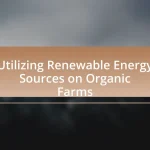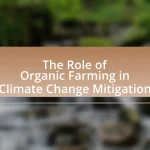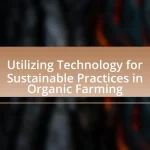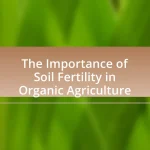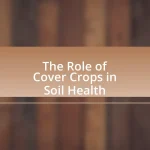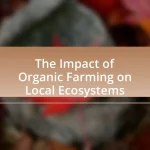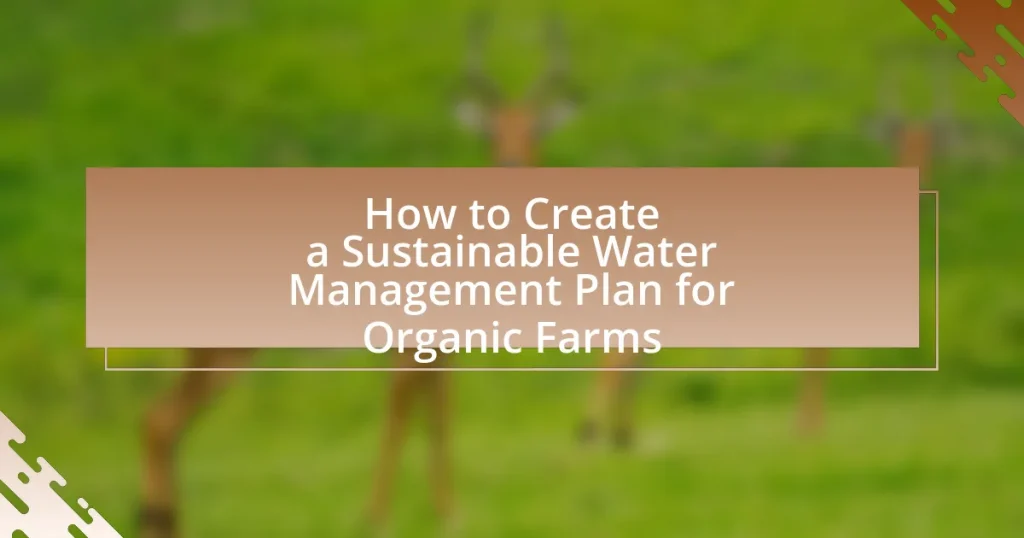A Sustainable Water Management Plan for Organic Farms is a strategic framework aimed at optimizing water use while preserving environmental integrity and supporting organic farming practices. This plan encompasses techniques such as rainwater harvesting, efficient irrigation systems, and soil moisture management, which can lead to significant reductions in water usage and improvements in crop yields. The article outlines the differences between sustainable and traditional water management, key principles of sustainable practices, and the importance of sustainability in organic farming. It also addresses challenges faced by organic farms, the impact of climate change on water availability, and effective irrigation techniques, providing practical tips for farmers to enhance water conservation and efficiency.
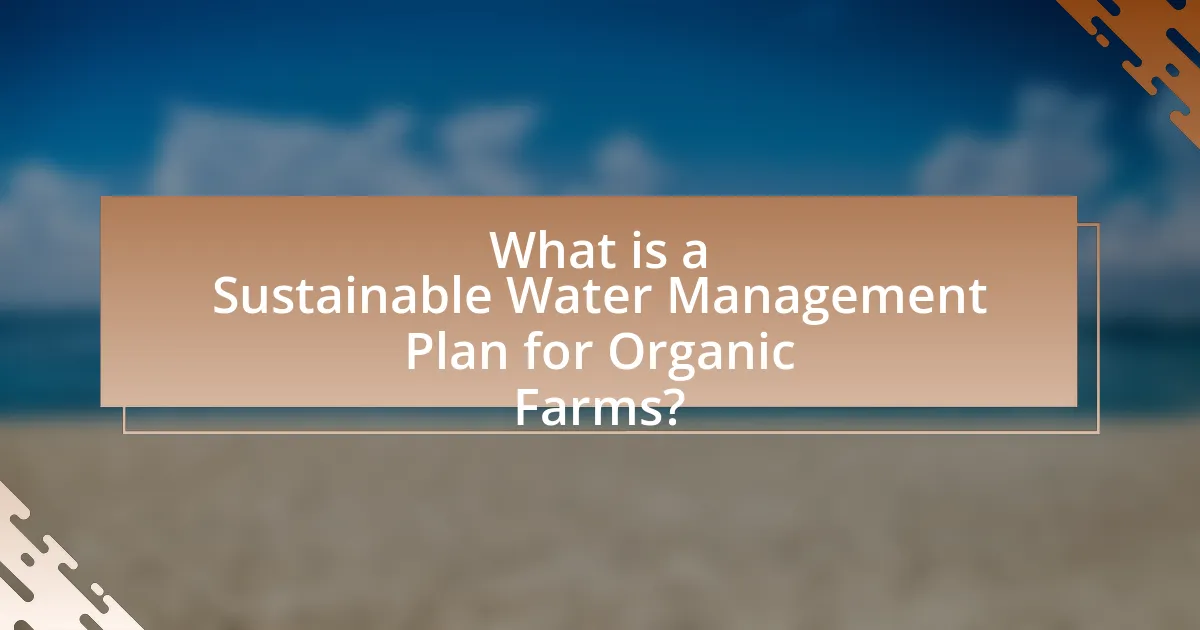
What is a Sustainable Water Management Plan for Organic Farms?
A Sustainable Water Management Plan for Organic Farms is a strategic framework designed to optimize water use while maintaining environmental integrity and supporting organic farming practices. This plan typically includes methods for rainwater harvesting, efficient irrigation systems, soil moisture management, and the use of cover crops to enhance water retention. Research indicates that implementing such plans can reduce water usage by up to 30% while improving crop yields and soil health, as demonstrated in studies conducted by the USDA and various agricultural universities.
How does a sustainable water management plan differ from traditional water management?
A sustainable water management plan focuses on long-term ecological balance and resource conservation, while traditional water management often prioritizes immediate human needs and economic growth. Sustainable plans incorporate practices such as rainwater harvesting, water recycling, and ecosystem restoration to ensure water availability for future generations, whereas traditional methods may rely heavily on extraction from natural sources without considering environmental impacts. For instance, sustainable practices can reduce water usage by up to 50% in agricultural settings, as demonstrated by studies showing that integrated water management can enhance crop yields while minimizing water waste.
What are the key principles of sustainable water management in agriculture?
The key principles of sustainable water management in agriculture include efficient water use, conservation practices, and integrated water resource management. Efficient water use involves employing techniques such as drip irrigation and scheduling irrigation based on crop needs, which can reduce water waste by up to 50%. Conservation practices, such as rainwater harvesting and soil moisture management, help maintain water quality and availability. Integrated water resource management emphasizes the coordination of water, land, and related resources to maximize economic and social welfare without compromising sustainability. These principles are supported by research indicating that sustainable practices can enhance crop yields while minimizing environmental impacts.
Why is sustainability important for water management in organic farming?
Sustainability is crucial for water management in organic farming because it ensures the efficient use of water resources while maintaining ecological balance. Sustainable practices, such as rainwater harvesting and drip irrigation, minimize water waste and enhance soil health, which is vital for organic farming. According to the Food and Agriculture Organization, sustainable water management can increase agricultural productivity by up to 40% while reducing water consumption. This approach not only conserves water but also supports biodiversity and reduces the risk of soil degradation, making it essential for the long-term viability of organic farming systems.
What are the main components of a sustainable water management plan?
The main components of a sustainable water management plan include water conservation practices, efficient irrigation systems, rainwater harvesting, water quality monitoring, and stakeholder engagement. Water conservation practices aim to reduce water usage through techniques such as mulching and crop rotation, which enhance soil moisture retention. Efficient irrigation systems, such as drip irrigation, minimize water waste and ensure that crops receive adequate moisture. Rainwater harvesting captures and stores rainwater for agricultural use, reducing reliance on groundwater and surface water sources. Water quality monitoring involves regular testing to ensure that water sources remain safe for agricultural use and do not harm the environment. Lastly, stakeholder engagement ensures that all parties, including farmers, local communities, and government agencies, collaborate effectively to manage water resources sustainably. These components collectively contribute to the resilience and sustainability of water management in organic farming.
How do water sources impact the sustainability of organic farms?
Water sources significantly impact the sustainability of organic farms by influencing irrigation practices, soil health, and crop yields. Reliable and clean water sources enable organic farmers to maintain consistent moisture levels, which is essential for the growth of organic crops. For instance, studies show that farms with access to sustainable water sources can achieve higher yields and better quality produce, as adequate water supply supports nutrient uptake and reduces plant stress. Furthermore, the management of water resources affects soil erosion and salinity levels, both critical factors in maintaining soil health and fertility over time. Thus, the availability and management of water sources are crucial for the long-term sustainability of organic farming practices.
What role does irrigation play in a sustainable water management plan?
Irrigation is essential in a sustainable water management plan as it optimizes water use for agricultural productivity while minimizing waste. Effective irrigation techniques, such as drip or subsurface irrigation, deliver water directly to plant roots, reducing evaporation and runoff. Research indicates that implementing efficient irrigation systems can decrease water usage by up to 50% compared to traditional methods, thereby conserving water resources and enhancing crop yields. This approach aligns with sustainable practices by ensuring that water is used judiciously, supporting both agricultural needs and environmental conservation.
What challenges do organic farms face in implementing sustainable water management?
Organic farms face significant challenges in implementing sustainable water management, primarily due to limited access to water resources and the need for compliance with organic certification standards. These farms often operate in regions where water scarcity is prevalent, making it difficult to secure sufficient water for irrigation. Additionally, organic farming practices, which prioritize soil health and biodiversity, may require more intricate water management strategies that can be resource-intensive. Research indicates that organic farms may also struggle with higher costs associated with sustainable irrigation technologies, such as drip irrigation systems, which are essential for efficient water use. Furthermore, the variability of climate conditions can exacerbate water management issues, leading to inconsistent water availability and increased competition for water among agricultural users.
How can climate change affect water availability for organic farms?
Climate change can significantly reduce water availability for organic farms by altering precipitation patterns and increasing evaporation rates. As global temperatures rise, regions may experience more intense droughts or irregular rainfall, leading to water scarcity. For instance, the Intergovernmental Panel on Climate Change (IPCC) reports that many agricultural areas are projected to face decreased water supply due to changing climate conditions, which directly impacts the irrigation needs of organic farms. This reduction in water availability can hinder crop growth and yield, making it essential for organic farmers to adapt their water management strategies to mitigate these effects.
What are common misconceptions about water use in organic farming?
Common misconceptions about water use in organic farming include the belief that organic farms require significantly more water than conventional farms. In reality, organic farming practices often enhance soil health and structure, leading to improved water retention and reduced irrigation needs. Research indicates that organic farms can use up to 30% less water due to practices such as cover cropping and mulching, which help maintain soil moisture. Another misconception is that organic farming is less efficient in water use; however, studies show that organic systems can be more resilient to drought conditions, further supporting efficient water management.
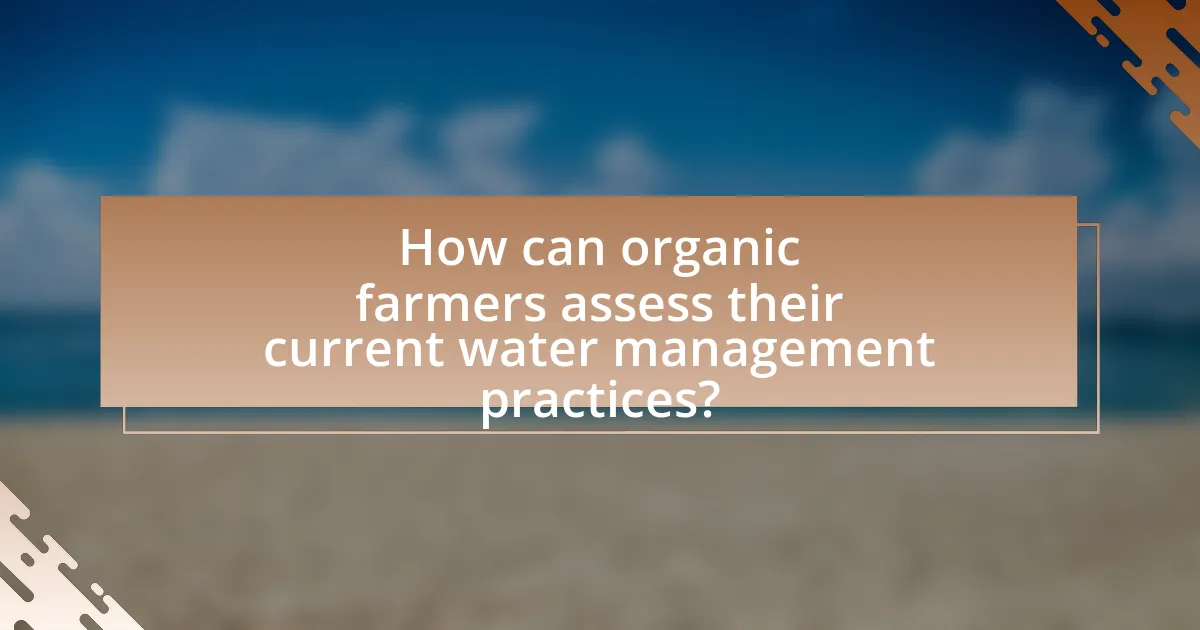
How can organic farmers assess their current water management practices?
Organic farmers can assess their current water management practices by conducting a comprehensive evaluation of their irrigation systems, water usage data, and soil moisture levels. This assessment involves analyzing the efficiency of irrigation methods, such as drip or sprinkler systems, and comparing water usage against crop needs to identify areas for improvement. Additionally, farmers can utilize soil moisture sensors to monitor water retention and determine if their practices align with sustainable water management principles. Research indicates that optimizing irrigation can reduce water usage by up to 30%, demonstrating the importance of regular assessments in enhancing water efficiency and sustainability in organic farming.
What tools and methods can be used for water usage assessment?
Tools and methods for water usage assessment include water meters, soil moisture sensors, and irrigation scheduling software. Water meters provide precise measurements of water consumption, allowing for accurate tracking of usage over time. Soil moisture sensors help determine the moisture levels in the soil, enabling farmers to optimize irrigation practices based on actual needs rather than estimates. Irrigation scheduling software analyzes weather data and soil conditions to recommend optimal irrigation times and amounts, thus improving water efficiency. These tools collectively enhance the ability to assess and manage water usage effectively, contributing to sustainable water management practices in organic farming.
How can farmers measure water efficiency on their farms?
Farmers can measure water efficiency on their farms by calculating the ratio of water used to the crop yield produced. This can be done using methods such as monitoring irrigation systems, employing soil moisture sensors, and analyzing crop water use data. For instance, a study by the USDA found that using soil moisture sensors can improve irrigation efficiency by up to 30%, allowing farmers to apply water only when necessary. Additionally, tracking the amount of water applied through irrigation systems against the yield harvested provides a clear metric for assessing water efficiency.
What indicators should farmers look for when evaluating their water management?
Farmers should look for indicators such as soil moisture levels, crop water use efficiency, and water quality when evaluating their water management. Soil moisture levels indicate the amount of water available to crops, which can be monitored using sensors or soil probes. Crop water use efficiency measures how effectively crops utilize water, often expressed as yield per unit of water applied. Water quality assessments, including pH and nutrient levels, ensure that the water used for irrigation is suitable for crops and does not harm the soil ecosystem. These indicators collectively help farmers optimize their water usage and maintain sustainable practices.
How can farmers identify areas for improvement in their water management?
Farmers can identify areas for improvement in their water management by conducting regular assessments of their irrigation systems and monitoring soil moisture levels. These assessments help pinpoint inefficiencies, such as over-irrigation or under-irrigation, which can lead to water wastage or crop stress. Utilizing tools like soil moisture sensors and flow meters provides concrete data that can guide adjustments in irrigation practices. Research indicates that implementing precision irrigation techniques can reduce water usage by up to 30%, demonstrating the effectiveness of targeted improvements in water management.
What strategies can be employed to enhance water conservation?
Implementing efficient irrigation techniques, such as drip irrigation and rainwater harvesting, can significantly enhance water conservation on organic farms. Drip irrigation delivers water directly to the plant roots, minimizing evaporation and runoff, which can lead to water savings of up to 60% compared to traditional methods. Rainwater harvesting systems capture and store rainwater for irrigation, reducing reliance on groundwater and municipal water sources. Additionally, adopting soil moisture sensors can optimize irrigation schedules, ensuring water is applied only when necessary, further conserving water resources. These strategies collectively contribute to sustainable water management in organic farming.
How can farmers engage with local resources for better water management?
Farmers can engage with local resources for better water management by collaborating with local water authorities and utilizing community-based water conservation programs. This collaboration allows farmers to access valuable information on water availability, quality, and management practices tailored to their specific region. For instance, studies have shown that farmers who participate in local watershed management initiatives can improve their water use efficiency by up to 30%, as they gain insights into sustainable practices and technologies that are effective in their area. Additionally, farmers can implement rainwater harvesting systems and participate in local soil and water conservation workshops, which are often organized by agricultural extension services or local NGOs, further enhancing their ability to manage water resources sustainably.

What best practices should be included in a sustainable water management plan?
A sustainable water management plan should include practices such as rainwater harvesting, efficient irrigation techniques, and soil moisture management. Rainwater harvesting captures and stores rainwater for agricultural use, reducing reliance on groundwater and surface water sources. Efficient irrigation techniques, such as drip irrigation, minimize water waste by delivering water directly to plant roots, which can lead to water savings of up to 50% compared to traditional methods. Soil moisture management involves monitoring and maintaining optimal soil moisture levels, which can enhance crop yield and reduce water consumption. These practices are supported by research indicating that sustainable water management can improve water efficiency and promote environmental health in agricultural settings.
How can crop selection influence water management strategies?
Crop selection significantly influences water management strategies by determining the water requirements and irrigation practices needed for different crops. For instance, drought-resistant crops such as sorghum or millet require less water compared to water-intensive crops like rice or cotton. This selection impacts the overall water usage efficiency on organic farms, as choosing crops that are well-suited to the local climate and soil conditions can reduce water consumption and improve sustainability. Research indicates that implementing crop rotation and selecting native species can enhance soil moisture retention and reduce irrigation needs, thereby optimizing water management practices.
What are drought-resistant crops that can be beneficial for organic farms?
Drought-resistant crops that can be beneficial for organic farms include sorghum, millet, and certain varieties of beans such as cowpeas. Sorghum is known for its ability to thrive in low-water conditions, making it a staple in arid regions. Millet, similarly, requires less water and can grow in poor soil, which is advantageous for organic farming practices. Cowpeas are not only drought-tolerant but also enrich the soil with nitrogen, enhancing soil fertility. These crops are supported by agricultural studies indicating their resilience and adaptability to dry conditions, thus making them suitable choices for sustainable organic farming.
How does crop rotation contribute to sustainable water management?
Crop rotation contributes to sustainable water management by enhancing soil structure and health, which improves water retention and reduces runoff. When different crops are planted in succession, their varying root systems help to create a more porous soil, allowing for better infiltration of water. Research indicates that fields with diverse crops can retain up to 30% more water compared to monoculture systems, as demonstrated in studies conducted by the USDA Agricultural Research Service. This increased water retention not only supports crop growth but also minimizes the need for irrigation, thereby conserving water resources.
What irrigation techniques are most effective for organic farms?
Drip irrigation and rainwater harvesting are the most effective irrigation techniques for organic farms. Drip irrigation delivers water directly to the plant roots, minimizing evaporation and runoff, which is crucial for maintaining soil health and conserving water. Research indicates that drip irrigation can reduce water usage by up to 50% compared to traditional methods, making it highly efficient for organic farming practices. Rainwater harvesting complements this by collecting and storing rainwater for irrigation, further enhancing water sustainability. Studies show that integrating these techniques can lead to improved crop yields and reduced dependency on external water sources, aligning with organic farming principles.
How can drip irrigation systems improve water efficiency?
Drip irrigation systems improve water efficiency by delivering water directly to the plant roots, minimizing evaporation and runoff. This targeted approach allows for precise control over water application, which can reduce water usage by up to 50% compared to traditional irrigation methods. Studies have shown that drip irrigation can lead to higher crop yields while using less water, making it an effective strategy for sustainable water management in organic farming.
What are the benefits of rainwater harvesting for organic farms?
Rainwater harvesting provides several benefits for organic farms, including improved water availability, reduced dependency on groundwater, and enhanced soil health. By collecting and storing rainwater, organic farms can ensure a consistent water supply, especially during dry periods, which is crucial for crop growth and sustainability. Additionally, utilizing rainwater helps to alleviate pressure on local aquifers, promoting better water resource management. Studies indicate that rainwater harvesting can lead to increased soil moisture levels, which supports beneficial microbial activity and nutrient cycling, ultimately enhancing crop yields and soil fertility.
What are some practical tips for implementing a sustainable water management plan?
To implement a sustainable water management plan, organic farms should prioritize rainwater harvesting, efficient irrigation systems, and soil moisture management. Rainwater harvesting captures and stores precipitation, reducing reliance on groundwater and surface water sources. Efficient irrigation systems, such as drip or sprinkler irrigation, minimize water waste by delivering water directly to plant roots. Soil moisture management techniques, including mulching and cover cropping, enhance soil health and retention, ensuring optimal water use. These practices collectively contribute to water conservation and improved crop yields, aligning with sustainable agricultural principles.
How can farmers create a water management schedule that aligns with crop needs?
Farmers can create a water management schedule that aligns with crop needs by assessing the specific water requirements of each crop throughout its growth stages. This involves monitoring soil moisture levels, understanding the crop’s growth cycle, and utilizing weather forecasts to anticipate rainfall and evaporation rates. Research indicates that crops like corn require approximately 20-25 inches of water during the growing season, while other crops may have different needs. By implementing soil moisture sensors and scheduling irrigation based on real-time data, farmers can optimize water usage, reduce waste, and ensure that crops receive adequate hydration at critical growth periods.
What resources are available for ongoing education in sustainable water practices?
Resources for ongoing education in sustainable water practices include online courses, workshops, and certification programs offered by organizations such as the Water Environment Federation and the American Water Works Association. These programs provide comprehensive training on water conservation techniques, irrigation management, and sustainable practices tailored for agricultural settings. Additionally, universities and agricultural extension services often provide research-based resources and educational materials focused on sustainable water management. For instance, the USDA’s Natural Resources Conservation Service offers guidelines and tools for farmers to implement effective water management strategies.
